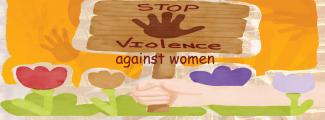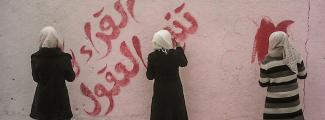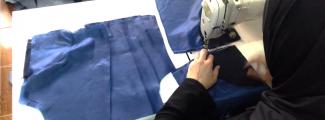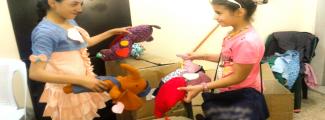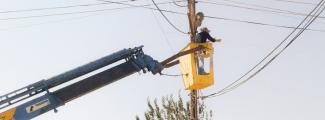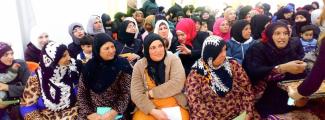Mrs. Tharaa (who hates to be called by that name) is 38 and comes from the city of Qamishli, Governorate of Hasakeh.
The story began when Tharaa was introduced to al-Salam Community Center by one of the beneficiaries in the Women’s Committees, who felt that it was necessary to help that woman ease the tension and relieve the terrible pressures she was experiencing.
She grew in a middle-class family. The greatest concern of her parents was to educate their children and secure their basic needs. She learned from her father determination, strength of character and challenging life odds.
She pursued her education despite the family’s difficult financial conditions and graduated from the Banking Institute with distinction in Accounting and an average score of 86.
For five years afterwards, she worked as an accountant in a children’s garment factory. She described that period as one of prosperity and emergence to the world as a vigorous, self-made and active woman, able to work in a male society and communicate with fellow workers in a large factory, winning the admiration and appreciation of everyone who knew her.
“I met my husband, who was also an accountant in the factory, and married at 25,” she said. “After our marriage, at my husband’s insistence, I had to choose between home and work. For him, it was either one or the other and this caused a great disagreement between us. It was either the work that I loved and wished for all my life, through which I emerged from my rabbit hole as a powerful working woman, or my family, which I also cherished and to which I was fully dedicated,” she added with evident sadness.
“In the end, I had to give in to my husband’s command and his urging me to quit work. My boring, cold life had started. I used to be a person full of energy, bubbling over with vitality, and now it was all over. I gradually became sluggish, like the unmoving waters on a seabed,” she confided almost crying.
One day, after an awareness session about intimate partner violence, Tharaa asked to talk to me in private. As soon as we entered the room, she began to cry. I tried to calm her down and ease her tension. She opened up and began to talk about her husband’s wrong practices, ignoring her desire to resume work, depreciating anything she did, destroying her spirits whenever she attempted to get up again or learn something new. “Whatever it is that I do, he always tells me I’m a failure, always criticizes me, which is frankly so demoralizing!”
Thus, right from the first session, Tharaa was able to diagnose her main problem, namely, the bad way her husband treated her, his ruthless ways of underestimating her abilities so she would never dream of going back to work again.
I started holding individual sessions with her. We jointly agreed upon the intervention plan which included her involvement in the CC’s programs, attending awareness sessions and referring her to the Vocational Training Program.
Tharaa also participated in the preparations for the 16 Days of Activism against Gender-based Violence campaign by doing paintings in which she expressed women’s dilemma. In fact, she liked painting a lot and was good at it, but as she put it, “Ever since I got married I have never held a pencil to draw anything, not even a rose!”
Tharaa wanted to develop her skills and learn everything new in order to prove to her husband that she was able to succeed.
When the Vocational Training Program started, she was referred to a sewing and embroidery training course. Quite naturally, she actively participated and distinguished herself.
Gradually, Tharaa changed and was able to rebuild her character, prove her abilities and talent to her milieu in general and to her husband in particular.
The opportunity came up when her family ran into financial hardship. She suggested to her husband to start a business, a small ready-to-wear store. First, he was unwilling to accept her proposal, since she was “a woman, unable to make a fateful decision concerning the family.” “How would you work in a store in the midst of a male society that would never accept it?” was his main argument.
After a long effort and much insistence, with us supporting her in improving communication with her husband, the man was won round to the idea and together they started their small business.
She began to run the shop and was thus back to work again. Her determination, success and masterful running of the business have had a positive impact on changing her husband’s attitude. Gradually he began to encourage her and thank her for standing by him and helping him out in this crisis. He was amazed to see how well she managed the store and coordinated the work on her own. He even began to help with some housework.
She expressed her great delight with the result she had reached. She also wished to conclude this stage of change in her life by changing her name too and filed a suit to that effect. Her name now is Hasnaa .
Thus, the intervention plan agreed upon with Hasnaa was successful, thanks to her stout determination to have a fresh start and prove her worth.
Alhama - Al-Salam
“My Most Beautiful School” CBI—Al-Hameh, Rural Damascus
Based on our wish to support community-based solutions, the Syrian Society for Social Development (SSSD), in cooperation with the United Nations High Commissioner for Refugees (UNHCR), implemented a community-based initiative in the Hameh Girls’ Preparatory School under the title “My Most Beautiful School.”
The aim of the initiative was to protect adolescent girls, strengthen their self-confidence and provide them with a safe and appropriate learning environment.
To that effect, various actions were done: protecting girls from the risk of broken glass by installing external wire netting on windows, painting the school walls with themes that inspire hope and encourage learning, repairing and repainting the school benches, protecting girls from diseases caused by moisture by insulating the roof. The CBI was concluded on 23/12/2017.
“Dressmaking for IDPs” CBI—Al-Hameh, Rural Damascus
In order to activate people’s potential and skills and support solutions emerging from the community, the Syrian Society for Social Development, in cooperation with UNHCR, implemented a community-based initiative at al-Hameh, Rural Damascus, under the title “Dressmaking for IDPs.”
The initiative aimed at promoting integration between the IDP and host communities by making clothes (jeans and cotton jumpsuits) for the adolescent sons and daughters of some IDP families currently living at al-Hameh district. The initiative was concluded on 30/07/2017.
The “Puppet” CBI—Al-Hameh, Rural Damascus
As part of our goal to promote integration between host and IDP communities, the Syrian Society for Social Development, in cooperation with UNHCR, implemented the “Puppets” community-based initiative at al-Hameh, Rural Damascus.
The concept of the initiative was that women of al-Hameh host community should make more than 500 puppets and offer them to IDP children. This welcome gesture would allow the children to express their thoughts/feelings and “see” their problems indirectly by projecting them on the puppet and by selecting puppets that correspond to their respective characters. The initiative was concluded on 18/07/2017 with a ceremony during which the puppets were distributed.
“Lighting” CBI—Qudsaya, Rural Damascus
As protection is the foundation of community-based initiatives, the Syrian Society for Social Development, in cooperation with UNHCR, implemented in Qudsaya, Rural Damascus, an initiative under the title Lighting.
The CBI aims to illuminate al-Jisr neighborhood at the Amal Square to provide night-time safety to the neighborhood residents by installing light projectors to protect residents from theft and spare women exposure to harassment.
The installation of lighting for the neighborhood was concluded on 27/07/2017.
International Women’s Day 2018
Syria holds fast thanks to Syrian women’s initiatives…
Rural Damascus
Jaramana District, Rural Damascus
Women’s activities:
The event started by welcoming mothers and introducing International Women’s Day. Then a video clip about age stages in the life of a woman was projected. The clip featured how that woman enjoyed her rights and performed her duties, successfully playing her role and supporting her daughter so she could embrace her role and vocation as a woman in both family and community. The conclusion ran thus, “No moment of life is complete without you. Thank you for being who you are: a woman!”
Some of the women’s comments were, “A successful mother is one who provides a positive environment for her children to grow”; “A successful mother is able to accompany her children onto success and the obtaining of rights.” Here we emphasized the importance of women’s role in family and community and explained why the 8th of March is an international day to celebrate womanhood.
Then a drama sketch performed by adolescents featured a brother who denied his sisters their rights to education, to work and to choose a partner. A lively debate followed on the concepts of ‘right’ and ‘duty.’ The women’s conclusion was, “A right is something necessary to get, something self-evident that every woman should enjoy. A duty, on the other hand, is a responsibility for something, such as caring for the children and the family. However, there must be a balance between right and duty to live a balanced, healthy life. In our society, women perform their duties but are denied their rights.”
At this point, the basic rights were introduced, the most fundamental of which according to women being: the right to education, work, opinion, choice of a partner, inheritance. Duties were also introduced: husband care, childcare, respect for husband and in-laws, sharing with husband in decision-making regarding the family, etc. It was duly emphasized in the process that a marital relationship based on partnership, respect for otherness, performance of duties and giving rights is a sound relationship upon which an ideal family can be built. This climate has a positive impact on society as well.
Then a young girl shared with the gathering a song about early marriage.
After that, an interactive drama sketch was performed, based on a radio broadcast about the role of women in community. Women keenly interacted. “Women are half the society and are capable of proving themselves,” said someone in the audience. “I’m a strong, successful woman, because I was able to meet all challenges, raised my children and helped them realize all I had been denied,” said another. At that point, SSSD facilitators explained that women have an important role in society; if they do not assume that role this will negatively reflect on them. Women have the ability to actively participate in all social, economic and political fields.
The discussion took then another turn by tackling the obstacles that women face during their lives and prevent them from obtaining their rights. These are, in women’s opinion, three:
- customs and traditions;
- the macho power that each father hands over to his sons, allowing them thus to exercise control over females; and
- ignorance and fear for girls, assuming they are “weaker creatures.”
At this point, we explained that this, even if true, is no reason to deprive women of their basic rights and of playing their role effectively in society.
At the end of the event, SSSD presented a pantomime sketch representing the various types of GBV. The sketch was an occasion to infer and discuss GBV consequences, psychologically, physically and socially: sorrow, anxiety, sleep disorders, bone fractures, bruises, antisocial behavior, etc. The solutions proposed by the women were:
- Nondiscrimination between children within the family, treating females and giving them their rights on an equal basis with males.
- Raising awareness about the preeminence of the role of women in the family and society at large.
- Amending some laws to improve the status of women.
At the end of the event, the Child Protection Club and a group of adolescents performed dances. Last but not least, one of the women shared a message addressed to every woman and every man: “Woman is mother, sister, daughter and wife…”
Adolescents and children’s activities:
The event began by welcoming adolescents and children and introducing the occasion: International Women’s Day, a world day celebrated on the 8th of March by all countries to emphasize the importance of the roles played by women during their lives and celebrate their achievements and successes.
We started with 2 video clips: one about a woman and her daughter, who got her rights and succeeded in achieving her goals and playing her roles throughout the stages of her life, the other about gender discrimination.
The young’s feedback: “The mother is a strong and successful woman who got her right to education, achieved her dream and helped her daughter achieve hers.” Here we emphasized the fact that women are capable of achieving their goals when they have the will and the strength to do so. Women have rights, just like men; therefore, there should be no discrimination between them.
After that, a group of young people performed a drama sketch about a brother depriving both his sisters of their rights to education, work and choosing a partner. The children understood well the contradiction inherent in the young man’s attitude: “He got his right to education and work, but prevents his sisters from getting their rights! How come?!” said a young girl. Although the eldest sister was deprived of education, she refused to deny her little sister this right.
When asked about the basic rights men and women should have, the recurrent answers were: the right to education, the right to live in safety, the right to express one’s opinion, the right to practice a hobby and develop one’s talent(s), the right to work. As for duties, the young came up with: respecting older people, helping one’s parents, respecting one’s parents, etc. Males and females have the same rights and duties and each human being has to get his rights and do his duties.
After that, a girl performed a song about early marriage that deprives children of childhood and denies them education.
The drama performance that followed aimed at defining gender equality/discrimination. According to the children, “there is no difference between male and female; they both have the same rights, and parents, therefore, mustn’t discriminate.”
After that, we moved to the issue of the various roles that a female can play. The young’s opinion was that “women can be teachers, doctors, everything—women are capable of doing anything.” Therefore, women and men are equal in rights and duties and have the right to claim their rights in a proper and informed manner.
The following drama sketch featured a girl who got the high school certificate with a very good score and wanted to become a mechanical engineer, but her mother rejected her daughter’s choice of career because mechanical engineering “is not suitable for girls.” Why? Because “people might gossip”!
The children’ opinion was that customs and traditions imposed on females to work in certain professions, mainly because of stereotyped views regarding what a girl can or cannot do; the fear of stigma is also considerable, thus contributing to the denial of girls’ rights.
Our comment was merely that these are no reasons or justification for deprivation of rights. Therefore, all must claim girl’s rights and gender equality.
A pantomime drama sketch tackled the issues of physical violence, early marriage and denial of education. When asked about the negative effects of violence and deprivation of rights, the most recurrent answers were: sorrow; depression; bruises; broken bones; absence of women in active social life, which negatively affects the individual, family and community, leading to family disintegration; divorce; inability to communicate with others—isolation; etc.
At the end of the debate—and the event--about solutions, the young’s program was:
- rights claiming;
- defining children’s rights and claiming them; and
- raising parents’ awareness about women’s rights (at this point, we emphasized the girl’s right to report if she is denied any of her rights).
The young’s messages to the community at large were:
- “Women are half the society and respecting them is an imperative”
- “In terms of rights and duties, we’re all equals”
Al-Farah Community Center, ‘Adra District, Rural Damascus
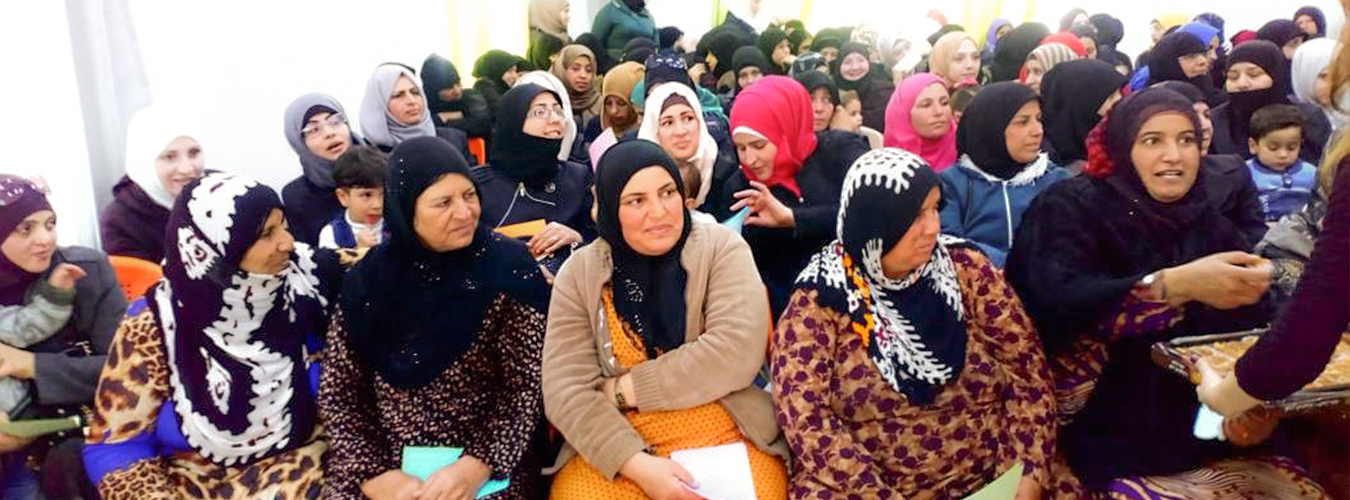
Activity description:
The event started with a song: One woman! after which SSSD delivered a short speech about the value of women and their great role and greeted them thus: May you become more beautiful and radiant each year! The women were deeply moved by the speech and signs of joy appeared on their faces.
The occasion for the event—International Women’s Day—was explained as most women were unaware that there was such a day for women to be celebrated!
The next activity was entitled How can you celebrate this day by yourself? The women shared some ideas, such as going to a place she loves, greeting her friends/mother, tasting a new kind of food, having a new plant reminding you of the occasion whenever you look at it, saving half an hour to learn about inspired women in the Arab world and the world at large.
After that, we presented a drama sketch that represents the life cycle of women and their role in life. The women enthusiastically interacted with the performance. The signs of admiration were clear on their faces. They said that the “play” really represented them and their lives, what they have to do and the challenges they face at every stage of their lives.
After that, two men greeted the women on the occasion of the International Women’s Day by reciting poems. The women truly appreciated the gesture, saying that was the first time they felt really happy.
The “riddle” activity comprised 2 life stories. One was about Oprah Winfrey. Some women had heard of her, so the following discussion touched upon Oprah’s vertiginous career, how despite all the violence she suffered, she resisted, challenged and achieved great successes.
The second life story was Zenobia’s, her achievements and strong personality. Even before the story was finished, the women identified the protagonist and expressed their pride of and admiration for her as a role model for the strong, undaunted woman.
Then some girls participated with a dance on the beat of the song It’s my right to draw and color. The performance was truly remarkable and the women were happy with it.
We then asked some of the women to volunteer for the “rights and duties” part. Two women participated, one mentioning a right and the other answering with a duty. For example:
Right to education " Duty to benefit the community with her education, teach her children
Right to work " Helping out/supporting her family financially
Etc.
The same applies to men.
Some women presented some of their handicrafts and had the opportunity to talk about manual work. They said that even if women’s work is simple, they can always do something, make a difference and are able to participate in the building and of advancement community.
Finally, some of the children presented greeting cards to the women on their Day. We had made these cards with the children during a previous activity. On the cards were written special greetings to enhance women’s self-confidence, such as You are the flower of life,” “You are a sunshine,” “Women are half the society and build the other half,” etc.
At the conclusion of the event, the women wrote down some wishes on a cardboard, and SSSD staff and volunteers thanked them for their attendance and participation.
Al-Salam Community Center, al-Hameh District, Rural Damascus
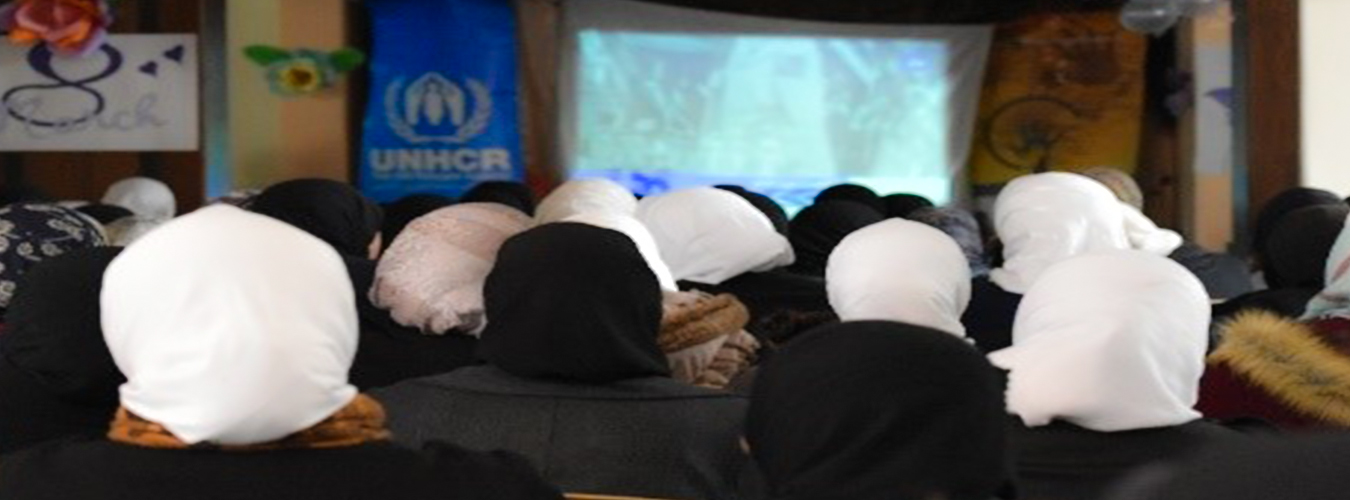
Activity description:
The event began with the song One Woman as an expression of the difficulties and problems experienced by women around the world.
SSSD then projected a video presentation about the history of International Women’s Day and why the 8th of March was chosen for the occasion. A discussion ensued.
Some women shared personal experiences and difficulties encountered during their lives. One woman recited a poem on the occasion.
A group of children staged a drama sketch centered on the hidden role of women in men’s lives.
A volunteer also presented a stand-up-comedy show, featuring the abilities that characterize women and the importance of these abilities to the family and social environment in which they live.
Women participated with a drama sketch that tackled the problems and challenges facing women in marital life, the inaccessibility to the least gender equality and women’s inability to express their opinion in front of their husbands. Then one of the women shared a personal experience with the guests and the difficulties she faced in completing her education and working to prove women’s ability to succeed. She was fully able to prove herself in the community and told how she finally obtained a university degree in Arabic literature.
We concluded the event with a dance performed by adolescent girls and children on the beat of the song I am half the world, Adam!
Feedback and impact:
The participation of adolescent girls with a dance of their own had definitely a positive impact. Some women’s sharing of personal experience had also a deep impact

